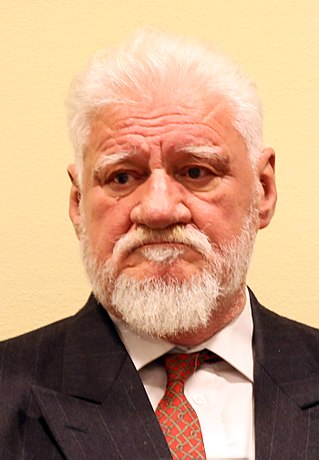
The International Criminal Tribunal for the former Yugoslavia (ICTY) was a body of the United Nations that was established to prosecute the war crimes that had been committed during the Yugoslav Wars and to try their perpetrators. The tribunal was an ad hoc court located in The Hague, Netherlands.

Naser Orić is a former Bosnian military officer who commanded Army of the Republic of Bosnia and Herzegovina (ARBiH) forces in the Srebrenica enclave in eastern Bosnia surrounded by Bosnian Serb forces, during the Bosnian War.

Slobodan Praljak was a Bosnian Croat war criminal who served in the Croatian Army and the Croatian Defence Council, an army of the Croatian Republic of Herzeg-Bosnia, between 1992 and 1995. Praljak was found guilty of committing violations of the laws of war, crimes against humanity, and breaches of the Geneva Conventions during the Croat–Bosniak War by the International Criminal Tribunal for the former Yugoslavia (ICTY) in 2017.

On 25 May 1995, the Army of Republika Srpska (VRS) launched an artillery attack against the town of Tuzla, which left 71 dead and 240 wounded. The event is also known as the Tuzla massacre.

The Čelebići camp was a concentration camp run by joint Bosniak and Bosnian Croat forces during the Bosnian War where Serb prisoners were detained and subjected to murder, beatings, torture, sexual assaults and otherwise cruel and inhumane treatment. The facility was used by several units of the Bosnian Ministry of the Interior (MUP), Croatian Defence Council (HVO) and later the Bosnian Territorial Defence Forces (TO). It was located in Čelebići, a village in the central Bosnian municipality of Konjic.
The Bosnian War attracted large numbers of foreign fighters and mercenaries from various countries. Volunteers came to fight for a variety of reasons including religious or ethnic loyalties, but mostly for money. Generally, Bosniaks received support from Muslim countries, Serbs from Eastern Orthodox countries, and Croats from Catholic countries. The numbers, activities and significance of the foreign fighters were often misrepresented. However, none of these groups constituted more than five percent of any of the respective armies' total manpower strength.

Milan Lukić is a Bosnian Serb war criminal who led the White Eagles paramilitary group during the Bosnian War. He was found guilty by the International Criminal Tribunal for the Former Yugoslavia (ICTY) in July 2009 of crimes against humanity and violations of war customs committed in the Višegrad municipality of Bosnia and Herzegovina during the Bosnian war and sentenced to life in prison.
Bosnian mujahideen, also called El Mudžahid, were foreign Muslim volunteers who fought on the Bosnian Muslim side during the 1992–95 Bosnian War. They first arrived in central Bosnia in the latter half of 1992 with the aim of helping their Bosnian Muslim co-religionists in fights against Serb and Croat forces. Initially they mainly came from Arab countries, later from other Muslim-majority countries. Estimates of their numbers vary from 500 to 6,000.

Rape during the Bosnian War was a policy of mass systemic violence targeted against women. While men from all ethnic groups committed rape, the vast majority of rapes were perpetrated by Bosnian Serb forces of the Army of the Republika Srpska (VRS) and Serb paramilitary units, who used rape as an instrument of terror and key tactics as part of their programme of ethnic cleansing. Estimates of the number of women raped during the war range between 10,000 and 50,000. Accurate numbers are difficult to establish and it is believed that the number of unreported cases is much higher than reported ones.
The 1992 Yugoslav People's Army column incident in Tuzla, also known as Tuzla column was an attack on the 92nd Motorized Brigade of the Yugoslav People's Army (JNA) in the Bosnian city of Tuzla on 15 May 1992. The incident occurred at the road junction of Brčanska Malta. At least 54 soldiers of the JNA were killed and 44 wounded during the attacks. What started off as a peaceful retreat by agreement with local authorities ended in an ambush, when Patriotic League, Green Berets and Bosniaks from local police attacked the column. It was a repeat of a similar incident that occurred in Sarajevo a week prior.

The Court of Bosnia and Herzegovina is the highest ordinary court of Bosnia and Herzegovina. It was established on 3 July 2002 by the Parliament of Bosnia and Herzegovina with the Law on the Court of BiH, promulgated on 12 November 2000 by the High Representative for Bosnia and Herzegovina.
Humanitarian Law Center (HLC) is the Serbian non-governmental organisation with offices in Belgrade, Serbia, and Pristina, Kosovo. It was founded in 1992 by Nataša Kandić to document human rights violations across the former Yugoslavia in armed conflicts in Croatia, Bosnia and Herzegovina, and, later, Kosovo.
The partition of Bosnia and Herzegovina was discussed and attempted during the 20th century. The issue came to prominence during the Bosnian War, which also involved Bosnia and Herzegovina's largest neighbors, Croatia and Serbia. As of 2023, the country remains one state while internal political divisions of Bosnia and Herzegovina based on the 1995 Dayton Agreement remain in place.

Sakib Mahmuljin is a Bosniak politician and former military leader who served as the commander of the 3rd Corps of the Army of the Republic of Bosnia and Herzegovina (ARBiH) during the Bosnian War. After the war, he was convicted of committing war crimes against Bosnian Serb prisoners and sentenced to eight years' imprisonment.

Velma Šarić is a Bosnian journalist and the founder and president of the Post-Conflict Research Center – a peace building organization, based in Sarajevo, which works to cultivate an environment for sustainable peace in Bosnia-Herzegovina and the greater Balkans region. As a trained researcher, journalist, and human rights defender, she has dedicated her career to investigative reporting and peace building in the Balkans. Velma works on behalf of marginalized groups in Bosnia-Herzegovina, promoting and encouraging respect for the rights of victims, women, and ethnic minorities.
Silos was a concentration camp operated by the Army of the Republic of Bosnia and Herzegovina (ARBiH) during the Bosnian War. Centered around a windowless grain silo, it was used to detain Bosnian Serb, and to a lesser extent Bosnian Croat, civilians between 1992 and 1996. The camp was located in the village of Tarčin, near the town of Hadžići, 10 kilometres (6.2 mi) west of Sarajevo. Inmates were subjected to beatings, given little food and kept in unsanitary conditions. Five-hundred Bosnian Serb and ninety Bosnian Croat civilians were detained at the camp; twenty-four prisoners lost their lives.
The Musala camp was a prison camp in Konjic, Bosnia and Herzegovina operated by the Army of the Republic of Bosnia and Herzegovina (ARBiH) that was used to detain Bosnian Serbs and Bosnian Croats.










